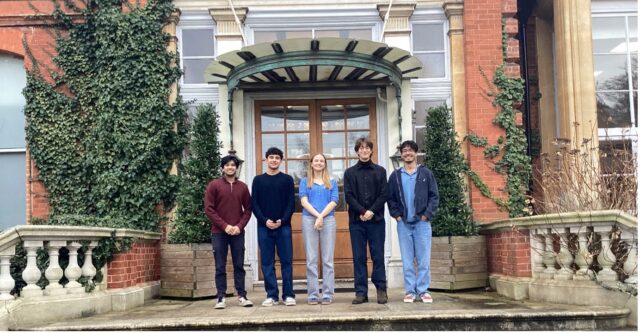20/03/2025
The Power of Enquiry-Led Learning in IB Education
Enquiry-led learning is at the heart of IB education, creating a dynamic, engaging educational experience that fosters creativity, critical thinking, and independence. At ACS Egham, this approach is implemented through the IB Primary Years Programme (IBPYP), empowering students to take charge of their learning and develop essential skills for the future. Let’s explore how enquiry-led learning shapes education and why it’s so effective in an IB setting.
What is Enquiry-Led Learning?
Enquiry-led learning is a student-centred approach that encourages learners to ask questions, explore topics of interest, and engage in real-world applications. Rather than relying solely on traditional teaching methods, this approach puts students at the forefront of their education, helping them to develop critical skills such as creativity, collaboration, and independent thinking. By promoting curiosity and exploration, enquiry-led learning fosters a sense of ownership over one’s learning journey.
Cross-Curricular Connections: The Key to Knowledgeable Learners
One of the standout features of enquiry-led learning is its emphasis on cross-curricular connections. In an IB educational environment, students explore knowledge across a range of disciplines and apply it in both local and global contexts. For example, students may study the Romans in history, create mosaics in art, and write about historical events in English. This interconnected approach helps students make meaningful connections between subjects and deepens their understanding.
By breaking down traditional subject boundaries, enquiry-led learning makes lessons more engaging and enjoyable. Students are able to bring their creativity into each subject they study, which makes learning not only more motivating but also more memorable. This holistic approach encourages students to think critically and creatively, applying what they learn to solve real-world problems.
Developing Critical and Creative Thinkers
In an enquiry-led learning environment, students are encouraged to develop both critical and creative thinking skills. An IB education promotes “Thinkers” who can approach complex problems with a balance of creativity and analysis. By encouraging ethical decision-making and providing opportunities for students to explore different perspectives, IB students become more open-minded, empathetic, and aware of the world around them.
Whether in the classroom or through outdoor learning, students are taught to use their initiative in making reasoned, ethical decisions. This focus on developing well-rounded thinkers prepares students for future challenges by teaching them to make responsible choices and take action on important issues.
The Importance of Communication in Enquiry-Led Learning
Effective communication is another key aspect of enquiry-led learning. The IB defines a good communicator as someone who confidently expresses themselves in multiple ways, whether through writing, speaking, drawing, or even dance. Students are also taught the equally important skill of listening – not only to hear others, but to respond thoughtfully, validating different viewpoints and fostering a collaborative learning environment.
Communication is vital for problem-solving and teamwork. In an enquiry-led setting, students work together, sharing ideas and building on each other’s contributions. This encourages a sense of community and strengthens their ability to work effectively with others, a critical skill in today’s interconnected world.
The Role of Integrity: Learning to be Principled
An IB education also places great emphasis on being principled, encouraging students to act with integrity, honesty, and fairness. Enquiry-led learning promotes ethical decision-making by guiding students to consider the consequences of their actions and to take responsibility for them.
Through global and local learning experiences, students explore issues of justice, fairness, and respect for the rights and dignity of others. This moral foundation helps students develop a strong sense of responsibility, not only for themselves but also for their communities and the wider world.
Enquiry-Led Learning in Action: Real-World Applications
At ACS Egham, enquiry-led learning comes to life in a variety of exciting and immersive ways. In Kindergarten, students lead their own shadow theatre production, from creative storytelling, to making puppets and performing for their peers. This hands-on, creative project encourages students to take ownership of their learning, applying imagination and critical thinking throughout the process.
Grade 5 students, on the other hand, dive into a real-world economics project, where they simulate the relationships between business and government. In this immersive project, they calculate taxes, apply for jobs, and negotiate salaries – all while learning valuable skills in mathematics, teamwork, and presentation.
Student-Led Learning: Shaping the Classroom
Enquiry-led learning empowers students to take the lead in their own education. Across ACS Egham’s Lower School, students drive their own enquiries, exploring topics that ignite their curiosity.
Across the Lower School, student-led learning takes many forms:
- Student-Driven Enquiries: In the Units of Enquiry, students shape their learning journeys by asking questions and exploring topics that spark their curiosity.
- Student-Organised Sustainability Group: During break times, students collaborate to promote environmental awareness and action.
- Student Council Initiatives: From planning school-wide celebrations to voicing student concerns, the council gives students a platform for leadership and responsibility.
- IB Primary Years Programme Exhibition (PYPx): This culminating project allows students to delve deeply into a topic of their choice, conducting research and presenting their findings.
- Personal Contributions: Students regularly bring books, ideas, and personal projects from home, enriching classroom discussions and learning.
Why Enquiry-Led Learning Matters
Enquiry-led learning isn’t just about answering questions; it’s about asking them. This approach fosters an energy and excitement that transforms students from passive participants into active contributors to their education. Their ideas, questions, and insights shape the learning environment, creating a dynamic atmosphere where curiosity is always encouraged.
Through enquiry-led learning, students don’t just absorb information—they apply it, question it, and use it to solve problems. This approach cultivates a lifelong love of learning and prepares students for the challenges of tomorrow’s world.
Conclusion
Enquiry-led learning is a transformative approach that encourages students to think critically, communicate effectively, and act with integrity. By empowering students to take control of their educational journey, the IB educational framework nurtures independent thinkers who are ready to tackle complex challenges in a global context. Whether through cross-curricular connections, creative projects, or student-led initiatives, enquiry-led learning provides an exciting, engaging, and enriching educational experience that prepares students for a successful future.






